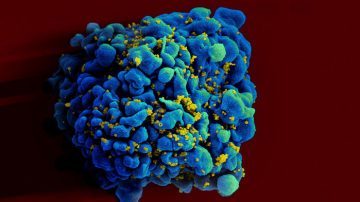Jon Cohen in Science:
 Drugs work stunningly well to control HIV—but not in everyone, and not without side effects. That’s why a small cadre of patients known as elite controllers has long fascinated researchers: Their immune system alone naturally suppresses HIV for decades without drugs. Now one team, inspired by success in mice, hopes to endow HIV-infected people with tailormade immune cells that target HIV, in effect creating elite controllers in the clinic. The immune strategy has risks, but it builds on increasingly popular cancer treatments with T cells engineered to have surface proteins, called chimeric antigen receptors (CARs), that can recognize markers on the surfaces of tumor cells and destroy the cancer. Such CAR T cells can also be tailored to identify and eliminate HIV-infected cells. This approach was tested in HIV-infected humans long before CAR T cells proved their worth against cancer, but it roundly failed. The field wants “to move what’s been learned from cancer back to HIV, completing the circle,” says Steven Deeks, an HIV/AIDS clinician at the University of California, San Francisco, who first tested a CAR T cell against the virus in the late 1990s.
Drugs work stunningly well to control HIV—but not in everyone, and not without side effects. That’s why a small cadre of patients known as elite controllers has long fascinated researchers: Their immune system alone naturally suppresses HIV for decades without drugs. Now one team, inspired by success in mice, hopes to endow HIV-infected people with tailormade immune cells that target HIV, in effect creating elite controllers in the clinic. The immune strategy has risks, but it builds on increasingly popular cancer treatments with T cells engineered to have surface proteins, called chimeric antigen receptors (CARs), that can recognize markers on the surfaces of tumor cells and destroy the cancer. Such CAR T cells can also be tailored to identify and eliminate HIV-infected cells. This approach was tested in HIV-infected humans long before CAR T cells proved their worth against cancer, but it roundly failed. The field wants “to move what’s been learned from cancer back to HIV, completing the circle,” says Steven Deeks, an HIV/AIDS clinician at the University of California, San Francisco, who first tested a CAR T cell against the virus in the late 1990s.
The new study—conducted by researchers from the University of Pittsburgh in Pennsylvania; the biotech company Lentigen in Gaithersburg, Maryland; and the Albert Einstein College of Medicine in New York City—uses a far more sophisticated CAR approach than the one Deeks tested. “It’s promising and seems to be more potent than what’s been tried in the past,” says stem cell biologist Hans-Peter Kiem, who has tested CAR T cells in leukemia and lymphoma patients at the Fred Hutchinson Cancer Research Center in Seattle, Washington. For the new work, published online this week in Science Translational Medicine, the researchers engineered T cells to include genes encoding two kinds of CARs, each targeting a different part of HIV’s surface protein. In test tube studies, this “duoCAR T” cell powerfully killed white blood cells infected with a diverse array of HIV variants, the group reports. The team also gave near simultaneous injections of CAR T cells and HIV-infected human cells to the spleens of mice with a “humanized” immune system. (Rodents cannot normally be infected with the AIDS virus.) When the group harvested spleens from the mice a week later, five of six mice had no detectable HIV DNA and their average viral levels had dropped 97.5%.
More here.
